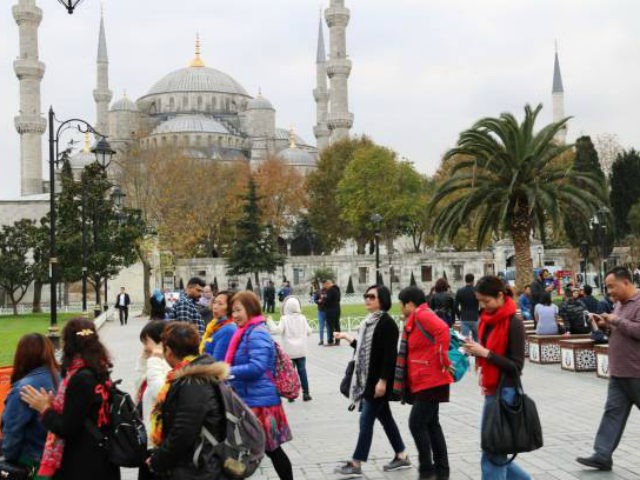Less than a week after French President Emmanuel Macron boasted that Western intervention in Syria had “divided” Turkey and Syria, Turkish officials boasted on Tuesday of closer economic ties to China, urging greater investment and tourism from the Asian power.
Though tensions between Russia and Turkey remain prominent, as President Recep Tayyip Erdogan opposes Syrian dictator Bashar al-Assad while Moscow provides him military and economic support, President Vladimir Putin visited Ankara this month to boost bilateral ties. The two countries differ significantly on foreign policy, but Russia has agreed to build the nation’s first nuclear power plant and develop deeper ties with Turkey.
China appears to be making a similar bid for dominance of the Turkish market.
“China will become one of the most important tourism partners of Turkey in the very near future,” Turkish Culture and Tourism Minister Numan Kurtulmus told reporters from Beijing on Tuesday, where he is attending the China International Tourism and Travel Fair. The state-run outlet Anadolu News Agency reports that Erdogan’s administration is seeking to double the number of Chinese tourists visiting the country and receiving exposure to Turkish culture – and spending their money in Turkey.
“Around 250,000 tourists came to Turkey last year. There is no reason not to increase this number to 500,000,” Kurtulmus insisted, suggesting that Turkey could build up its tourism industry to welcome up to 28 million foreigners in 2018.
The minister said that China was one of many Asian countries from which Turkey hoped to attract more tourists, including India, Japan, Malaysia, and Indonesia.
Turkey is recovering from a disastrous two years in tourism, an industry ravaged by the news of a failed coup against Erdogan and multiple Islamic State attacks on tourist destinations, such as airports and nightclubs. Erdogan announced Monday that his government will continue to invest heavily in policies to help businesses thrive, including attracting tourists.
“Our tourism sector suffered due to the coup attempts, but we also overcame them. This year our expectations from tourism are quite high. We are expecting more than 36 million tourists. There are some serious signs of improvement in this regard,” Erdoğan said, noting that among Turkey’s new investment projects will be the construction of a new airport.
China, meanwhile, has turned its eye to the Middle East as a major focal point of its sprawling One Belt, One Road (OBOR) plan, designed to give China almost full control of major ports and infrastructure projects from Beijing to western Europe. Erdogan attended a Belt and Road summit in China last year, seeking investment opportunities for Turkey.
The relationship between China and Turkey has been marred by their disparate approaches to Islam. While Erdogan is an Islamist leader and has slowly pushed the Islamicization of public life, education, and government in Turkey, China has boosted efforts to eradicate Islam from public life, particularly in western Xinjiang province, home to the Turkic Uighur minority. China has forced some Uighur Muslims into political “re-education” camps, where witnesses say they are forced to eat pork and listen to hours of communist propaganda.
Erdogan has spoken out against the repression of Uighur Muslims, whom Ankara feels a responsibility to defend, as they are a Turkic people. Recently, however, Turkey has placed great emphasis on a positive economic relationship with China.
Erdogan has tried to do the same with Russia. During Putin’s visit to Turkey last week, Erdogan celebrated the launch of efforts to construct the country’s first nuclear power plant, a Russian project worth $20 billion. Putin proclaimed that Russia was “founding Turkey’s nuclear sector” and would expand its role in the Turkish economy. The two countries appeared to have found a way to negotiate around their disagreements in the Syrian civil war. Turkey sent troops into northern Afrin province in January to combat the Syrian Kurdish People’s Protection Units (YPG/YPJ) but stayed away from Assad-held areas. The Russians aided Assad but did nothing to help their allies, the YPG.
Then during the weekend, a U.S.-U.K.-French coalition attacked Assad targets in Damascus. Russia vehemently condemned the attack. Erdogan lamented it was not enough.
“With these strikes and this intervention, we separated the Russians and the Turks on this issue… the Turks condemned the chemical strike and supported the operation that we conducted,” French President Macron said on Sunday, triggering a vocal rejection of his claim from both countries.
Erdogan told Iranian President Hassan Rouhani in a phone call Tuesday that he was committed to cooperation in Syria with Russia. Yet cracks had begun to show in their alliance even before the coalition airstrikes, as Russia pressured Erdogan to cede to Assad the territory Turkey seized from the Kurds. While economic ties currently seem stable, Turkey’s further involvement in supporting action against Assad may soon require it to look elsewhere for economic partners.

COMMENTS
Please let us know if you're having issues with commenting.